A Conversation with Samuel Moyn: The Cold War and the Canon of Liberalism
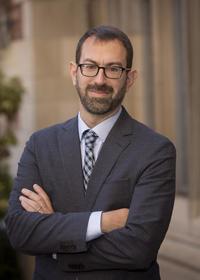
A conversation with Samuel Moyn, Henry R. Luce Professor of Jurisprudence at Yale Law School and Professor of History at Yale University, discussing his 2022 Carlyle Lectures in the History of Political Thought: The Cold War and the Canon of Liberalism.
By Dan McAteer, DPhil in Modern Intellectual History at Wadham College, Oxford.
DANIEL MCATEER: The title of the 2022 Carlyle Lectures was The Cold War and the Canon of Liberalism. Could you briefly summarise your lectures and what you were trying to achieve?
SAMUEL MOYN: The basic goal was to give a synthetic account of something called Cold War liberalism, through a re-reading of six figures: Judith Shklar, Isaiah Berlin, Karl Popper, Gertrude Himmelfarb, Hannah Arendt, and Lionel Trilling. I tried to argue, as persuasively as I could, that it represented an intentional break with various features of the past of liberalism. And I tried to show this by looking at what I call the “canonical work” that’s always going on in intellectual life, in which the Cold War liberals deaccessioned emancipatory theory from the Enlightenment to G.W.F. Hegel, and then make substitutions that focus on human limits, whether in the psyche or in sin. The more normative or political claim of the Lectures is that this revision of liberalism has been catastrophic.
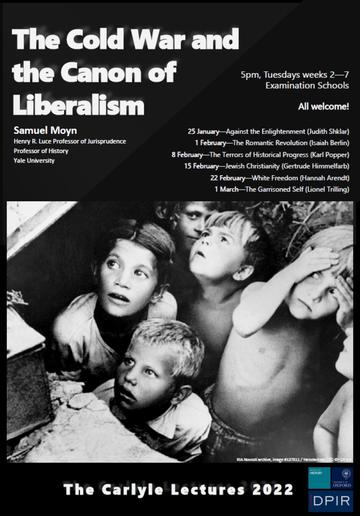
DM: I thought I’d start with the fact that when you began these Carlyle Lectures some weeks ago, we lived in a different world. Covid restrictions were in place limiting the number of people who could attend. These were then lifted and a sense of normality perhaps returned. Suddenly, we are plunged into a new crisis, a new era with the Russian invasion of Ukraine. These events speak powerfully to the themes explored in your lectures with the revivification of Cold War language, and even of nuclear apocalypticism. Although very early on in the conflict and crisis, how do you feel your Carlyle Lectures address our contemporary moment?
SM: Well, I’m living with everyone else in this moment of geopolitical confrontation with the Soviet Union’s successor, which has led a lot of people in the west toward the familiar tropes of the Cold War. And yet, I would say that’s been a kind of repeated experience for generations now. There’s been a reinstatement of this Cold War frame in response to various crises and threats. It happened after September 11th 2001, it happened after the election of Donald Trump, and now it’s happening again, some people will say more legitimately since it’s actually a military contest with the same foe, or rather the successor of that same foe. Some are saying Ukraine opens a “new era.” But I would want to caution against colluding in this Cold War renaissance by overstating how novel a moment we are in. These ghosts are very easy to summon back, and the fact we keep doing so suggests that perhaps there has not been as great a change as we think, that maybe there will be a negotiated settlement to the Ukraine War, and the same kind of stand-off with the second-rate power that Russia is. That’s really quite different in real terms compared with the actual Cold War. But then what’s remarkable is how convenient this Cold War frame is in relation to a series of things that liberals haven’t dealt with well in the last fifty years.
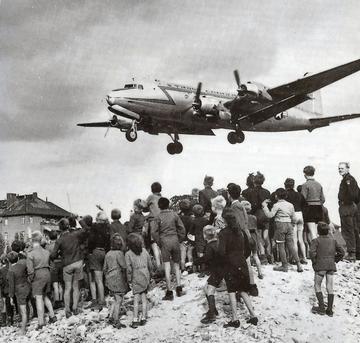
Berliners watching a C-54 land at Tempelhof Airport (1948).
DM: But although Cold War-style rhetoric is back with a bang, it’s also as if the 90s vision of the globalised economy is itself being weaponised, the financial system is being leveraged, transnational corporations and Big Tech are pulling out of Russia, a luxurious global elite lifestyle is being targeted through sanctions, and so forth. We’ve even had Francis Fukuyama himself in the Financial Times recently saying we need to ‘rekindle the spirit of 1989.’
SM: Yes, the situation is so profoundly different. Vladimir Putin does not have a universal emancipatory message that is lighting the world on fire. When Cold War liberalism crystallised in the 1940s and 1950s, it faced a foe of a different magnitude. Back then, the Soviet Union was much stronger; it had ideological credibility as the victor in World War II. In contrast, Putin’s at the head of a second-rate power with no prospects for getting back to geopolitical centrality. And then, as you say, Russia is much more integrated, especially as a petroleum state, in the world economic order. Those rich people who have benefited from the neoliberal 90s and the sell-off of state assets are much more integrated in our globalised world. The struggle is radically different in form, both in terms of the target and the tools that both sides are using.
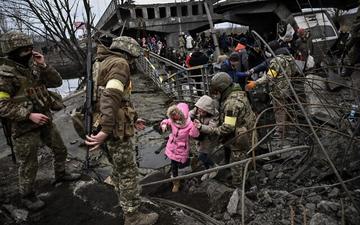
People cross a destroyed bridge as they evacuate the city of Irpin, northwest of Kyiv, during heavy shelling and bombing on March 5, 2022, 10 days after Russia launched a military invasion of Ukraine. (Aris Messinis/AFP/TI).
DM: While one doesn’t want to overemphasise superpower ideological rivalry at the cost of the global South context in the Cold War, it does seem that at least in terms of the intellectual effects, as you say, the fact that Putin is not really utopian at all makes it hard to shoe-horn him into a kind of Talmonian “Rousseau to the Red Army” narrative.
SM: I think that’s right. None of that seems to be coming back. Rather, there is a return of the democracy vs. authoritarianism frame, if not totalitarianism, and the rhetoric of the free world and its institutional incarnation in NATO have been resuscitated from the dead. These are products of the 40s and 50s, but the ideological content is shifting. The Cold War liberals discussed in my lectures are not as relevant now because they really were specifically interested in Soviet communism. And yet many of the binaries are living a zombie life even so.
DM: Aside from Ukraine, another way in which people talk about the “Long Nineties” ending was the pandemic and some talk of the definitive return of the state. Paolo Gerbaudo in his The Great Recoil (2021), writes of neo-statism as succeeding neoliberalism. In the UK there was a revival of softly utopian rhetoric about WWII leading to the creation of the NHS, and that therefore the pandemic will enable another great step forward. But that kind of hopefulness seems suddenly absent again. Instead, we see a very different kind of wartime rhetoric being deployed, of economic war on Russia, where the poor are expected to make sacrifices through their gas bills. Do you think this mirrors your arguments in the Carlyle Lectures about Cold War liberalism’s suffocation of utopian traditions in liberal thought?
SM: It’s a fantastic question. Of course, I didn’t write the Carlyle Lectures in wartime. But I did adopt a framework which placed strong emphasis on the fact that Cold War liberalism was not just about legitimating the west against its global enemies, whether they were communist or global South liberationists. Cold War liberalism was also about proscribing a certain politics within the west itself. So I think it was quite fundamental in transatlantic spaces that Cold War liberals banned optimism and utopianism, and issued a call for constraints and self-constraint, to the point that they didn’t even set out to defend the modest steps towards welfare states that the actual liberals were in practice taking when these figures were writing. I think that had a humongous impact on the 90s. I can concede that there were covert forms of trying to present liberal utopias, but the Cold War frame, even in the present, left this legacy of evacuating the utopian imagination. These lectures are also written in the presence of a new moment, in which a new generation is trying to reactivate socialism, and maybe utopianism, and reject the compromises which I think have characterised liberalism for a half century.
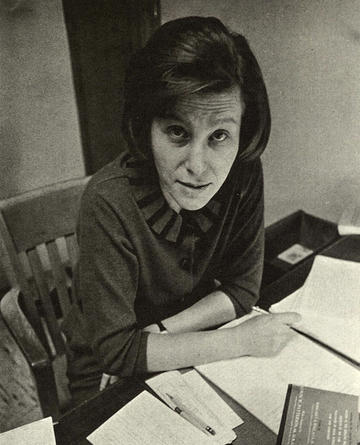
Judith Shklar pictured in the 1966 Harvard Yearbook (Harvard Yearbook Publications).
DM: Well, sticking with the utopianism, a prominent theme that runs through a lot of your work. Your Carlyle Lectures began with reflecting on Shklar’s After Utopia (1957), where she notes a certain pessimism in liberal thought, a philosophy ‘sure to appeal to those who have seen enough of civil war and ideological wrangling to last forever.’ Rather than seizing the reins of historical opportunity, Shklar sensed instead a desire to bring up the drawbridge, defend what had been achieved, and perhaps improve it incrementally. This raises the question of what came before Cold War liberalism, which was something you didn’t have time to go into in more detail. Could you say a bit more about how liberalism before Cold War liberalism was different? Did it have a more open attitude towards utopianism, for example?
SM: It’s pretty essential to my approach in these lectures that I’m working with the story of baseline and deviation: Cold War liberalism as a break with what came before. And yet, because I chose to just look at the deviants, I imply only in passing the nature of what they overturned, and I don’t substantiate what I have in mind. Starting with the first lecture, Shklar was given her title by her editors. I think the book would have been more appropriately called “After the Enlightenment.” The first lecture then is really about how an Enlightenment conception of emancipating agency had been central to the liberal cause. In the second lecture I dwell on how liberals were frequently committed to romantic creativity. The kind of agency at stake in many forms of nineteenth-century liberalism was connected with the imagination, and about self-making in a nearly artistic sense: adding novelty to the world, both individually and collectively. The third lecture is about the kind of Hegelian form of not only much of nineteenth-century thought, but also of liberalism too. There was an understanding that emancipation is a collective historical project. In addition, as the century unfolds, and then especially in the twentieth century, you get a very muddy line between liberalism and socialism. This is because liberals are schooled by Karl Marx, and the existence of socialist movements, whatever their own goals, in understanding that formal freedom is insufficient. And so liberals adopt, as part of their own historical progressivism, a commitment—at least in thought, if not sufficiently so in practice—to discovering the institutional forms of collective freedom, including the substantive conditions that are more than just the formal emancipation that they agree Marx correctly denounced. All of that is cut off by the Cold War, in which you get a much more libertarian framing of liberalism. That’s mainly what I’m complaining about in these lectures.
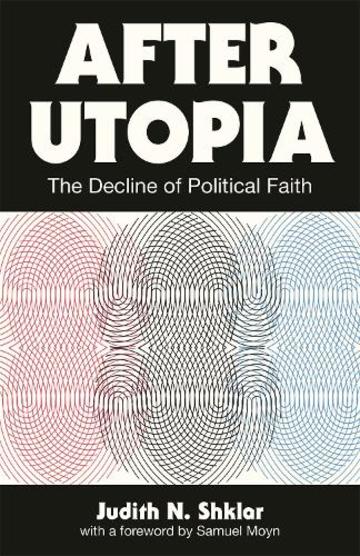
Judith N. Shklar, After Utopia: The Decline of Political Faith, Foreword by Samuel Moyn, 2020 (first published 1957).
DM: Is there always a risk of nostalgia for other forms of liberalism and socialism though? On the one hand, when we cast our eyes back to the construction of the welfare state and the Swedish social scientists Gunnar and Alva Myrdal’s unashamed internationalism and globalism of the 1950s, for example, these things hold a lot of emotive power for contemporary left thinking. On the other hand, however, in Sweden the Myrdals’ reputation is contorted by their support for eugenic sterilisation, and many historians underline the centrality of eugenics to Scandinavian welfare state ideology in this period. In your Carlyle Lectures, it seemed like you began to broach this tension with the concept of the ethical state, a state beyond either the nightwatchman’s minimalism or bureaucratic control. Could you say a little bit more about this?
SM: Sure, so the perspective of these lectures is left Hegelian. It’s not specifically about the welfare state, which I don’t see as—and I don’t think left Hegelians should think of as—the end of history. That being said, you’re right that American liberals are nostalgic for the New Deal or the welfare state that they understand that they didn’t get, and then idealise Denmark or Sweden. There’s no nostalgia for that in these lectures, except insofar as it shows that there were alternative liberalisms. And there’s absolutely no suggestion that we just surgically extract liberalism before the Cold War came and graft it on to our present. But we should rehabilitate some of its impulses and return to some of its thinkers as ways of extricating ourselves from the Cold War syndrome. The significance of the left Hegelian tradition is about a kind of emancipatory statism through the institutionalisation of a free community of equals who are creative agents. That’s what I think liberalism ought to be trying to bring about, which is not at all bureaucratic or technocratic. There’s a very interesting distinction that some have used, like Svetlana Boym, about different forms of nostalgia. The point is not to luxuriate about what came before, but instead to treat the past as a critical resource for getting what we’ve never had. That’s the kind of spirit of these lectures, and I really want to avoid any complacent nostalgia, where the idea is just to go back. The welfare state was eugenic in Sweden and some other countries, and deeply exclusionary everywhere, especially along lines of gender, but also (where it mattered) race. And so, the New Deal was an incredibly compromised project all the way down. It is not a credible starting point, but we do have to have a theory of emancipation through the state and history. The nineteenth century is a better resource for that approach than our politics, call it liberal or socialist or liberal-socialist, than anything we’ve seen in the last few decades.
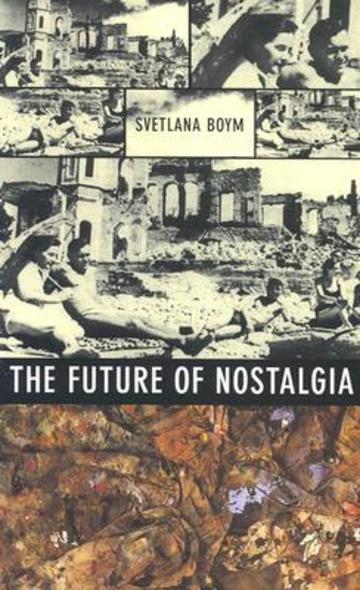
Svetlana Boym, The Future of Nostalgia (2001).
DM: So if your project is left Hegelian, what is its main attempt at synthesis? Is it to reconcile what we might call a post-1968 attitude to social and cultural issues with a more muscular approach to markets and capitalism?
SM: Well, I think that’s right. The New Left properly rebelled against the bureaucratic and conformist state that they inherited. But then they, in a sense, colluded in throwing the baby out with the bathwater, and bringing about a kind of neoliberal reality that was worse than what they inherited. So I assume that there are always going to be challenges about reconciling individual autonomy and collective life–duties that states are there to impose on us. I think we should want a political culture in which citizens do have relations of obligation to other citizens and to their states, including very literal duties such as taxes. But of course, the purpose of the ethical state, as I mentioned before, is creative expression. A conformist and repressive state is not the ethical state. It is not that I understate the difficulty of reconciling the libertarian aspect of liberalism and the era since the 60s. It is rather that I see the solutions as lying within the state, however reformed it would have to be, rather than through some alternative to the state itself.
DM: So it feels almost like another project, exploring liberalism through the eyes of those that came before Cold War liberalism? I’m thinking, for example, of some interwar thinkers who looked towards collective institutions to implement greater cultural freedom, a perspective which was perhaps less tinged by statist vs. anti-statist binaries than the lenses that we’ve inherited.
SM: That sounds right to me. I don’t know if I’ll ever do more on this, but I have always wanted to write a book about Tocqueville, which would spell out how he wasn’t a Cold War liberal, but the kind of liberal I’m thinking about. His basic question was: how do we institutionalise a free community of creative equals? And that’s an institutional problem. He’s not anti-statist or statist, and I think that’s a false binary that we should give up, in order to ask what are the institutions that effectuate freedom and limits.
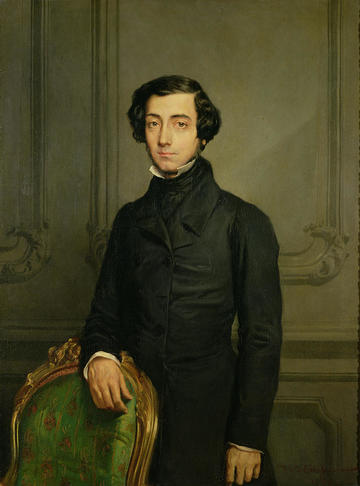
Alexis de Tocqueville (1805-1859) by Théodore Chassériau, 1850, at the Palace of Versailles.
DM: A major theme in the second lecture was Cold War liberalism’s construction of an “anti-canon,” a villain’s gallery through which Cold War liberals discerned a totalitarian thread from romanticism to the gulag. But this kind of narrative was not confined to Cold War liberalism, it could also be found on the left. In the final lecture, you mentioned Adorno and Horkhiemer, whose Dialectic of Enlightenment (1947) painted a similarly grim picture of the Enlightenment’s totalitarian energies. In your The Last Utopia: Human Rights in History (2010), you also discuss André Glucksmann’s The Master Thinkers (1977), for example, which mounted a similar critique. And this ties in with the work of other historians such as Emile Chabal, Daniel Zamora and Michael Behrent. So I was wondering if you could talk more about Cold War liberalism’s parallels on the left, and what their significance might be?
SM: It’s a terrific question, and in brief response I think I’ll say that the Cold War was not just disastrous for liberalism but for left theory as well. The Frankfurt School in general can be seen, especially in its more pessimistic guises like Adorno and Horkheimer’s Dialectic of Enlightenment, as a kind of Cold War liberalism within Marxism. I think it’s kind of interesting that they have been celebrated as an alternative to Cold War liberalism when, as I tried to explain in the last lecture, the parallelisms are just as striking. Now, more broadly, I guess I would say that this is one of the reasons why I don’t want to present myself as a nostalgist, as someone saying we have some ready-made theoretical solution that we just extricate from its own failure in the past and put to our own uses, because I think we’re more or less on our own. I do mention the left Hegelian tradition, with which the Frankfurt School was also in touch, but in an attenuated and possibly traitorous way. I did give some love to my favourite left Hegelian, Maurice Merleau-Ponty, who was also interested in psychoanalysis, very good friends with Lacan, and makes possible a return to the kind of left Hegelianism that might accommodate insight into psyche and subjectivity in a way we really haven’t capitalised on yet.
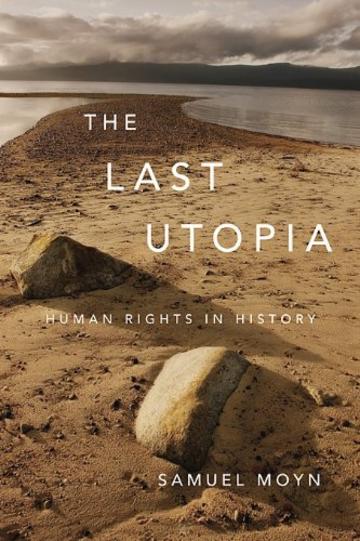
Samuel Moyn, The Last Utopia: Human Rights in History, 2010.
DM: Well, why don’t we talk about that then? With Cold War liberalism and politics generally, it feels like we get contortions within contortions–Jurgen Habermas is a good example. On the one hand, he lambasts Foucault and others as the ‘young conservatives,’ because by abandoning Enlightenment universalism he says they also relinquished the Enlightenment’s utopian energies. On the other hand, Habermas could also be seen as a fairly conservative thinker, valuing classic liberals principles like free, rational debate, and so on. For you, how does someone like Merleau-Ponty help us move beyond some of these impasses?
SM: Well I think Habermas has never gotten the kind of fundamental criticism he deserves for abandoning the most promising aspects of the Frankfurt school. He emerges in parallel with Shklar as someone who understands the importance of the emancipatory elements of the Enlightenment, which his teachers had themselves treated as a source of totalitarianism. This can be seen in his 1962 book The Structural Transformation of the Public Sphere. But in the end he becomes a kind of neo-Kantian liberal, something which is so familiar in the Anglo-American landscape that he almost becomes redundant.
Merleau-Ponty died young, in 1961; but he was on a very interesting trajectory by the end of his life. In the 1940s, he had become very nervous about Cold War liberalism, as it abandoned a credible emancipatory framework and rejected any kind of Hegelian philosophy of history. I think Merleau-Ponty wanted to build such a philosophy himself but dropped dead.
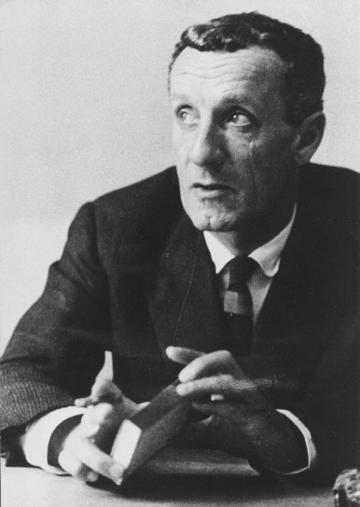
Maurice Merleau-Ponty (1908–1961).
So I sort of see us as in a position to build such a thing in our own day. Perhaps there is some use in some of Habermas’ mid-career social theory. But, at least in public discourse, he has mainly been celebrated as a kind of constitutionalist liberal. That kind of constitutionalism has shown its limits. By retreating from the Frankfurt School’s radicalism, Habermas is implicated in a betrayal of left theory, and we should take caution from that mistake.
DM: Changing tack from the intersection between left thought and neoliberalism to the relationship between Cold War liberalism and neoliberalism, you mentioned Berlin’s rather entertaining dismissal of Hayek as ‘just as much of a dodo as von Mises.’ Could you say a bit more about this?
SM: I was sensitive to the fact that the defenders of Cold War liberalism—and most people who write about Cold War liberals are defenders—unfailingly specify that they weren’t neoliberals, and they were even ‘functionally social democrats,’ as Jan-Werner Müller writes at one point. And that’s where I part ways with such extenuating commentary because I think it’s altogether striking how many contiguities and overlaps the Cold War liberals had from the outset with neoliberals. One of the main points of the lectures in this regard is to say that the canonical work that the Cold War liberals do overlaps substantially with that of the neoliberals, rejecting the same people and often embracing the same people. (Both Cold War liberals and neoliberals celebrate Lord Acton, for example, as one lecture details.) However, I think my principal charge against Cold War liberals is that, oriented to external totalitarianism, they really scant the project of theorising an alternative, that isn’t libertarian and neoliberal, and in a sense set up the intellectual context for the victory of people whom they’re supposedly rejecting. And maybe they did that for ideological reasons, or because there were enough points of proximity to these alleged enemies that they really just set the table for the neoliberal era. Regardless, I don’t think we can rest content with an apologetic account of Cold War liberalism that just complacently says “they were for redistribution” and fails to note the rest.
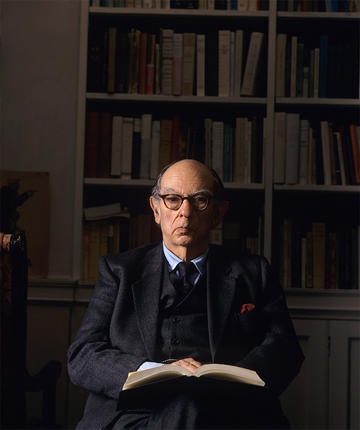
Isaiah Berlin (1909-1997).
DM: I suppose one area of intrigue in that regard is the question of utopia. Hayek is very well known for a 1949 quote that, ‘what we lack is a liberal utopia,’ whereas for Shklar, these neoliberals were profoundly anti-utopian. It seems that neoliberalism is Janus faced, that sometimes “there is no alternative,” but at other times it mobilises a utopian element.
SM: I think that’s a great point. I mean, Shklar hadn’t read Quinn Slobodian’s Globalists: The End of Empire and the Birth of Neoliberalism (2018). She’s interpreting the theoretical writings of neoliberalism, which seemed to be an abandonment of conscious agency in the name of tradition. And it may be a kind of liberal market tradition, but the central figure for Hayek as he evolves is Edmund Burke. I think Shklar really wants to emphasise that if you read his writing, Hayek and especially others really do seem to fear the emancipation of agency, and they denounce romanticism, Hegelianism, and historicism just like the Cold War liberals. So could we argue that there’s actually an activist programme at the heart of neoliberalism in power? Well, for sure. But it’s not something that early neoliberals theorise; they execute it. And I think that’s always a really interesting project, to look at what people say and believe, and to look at what they do. These lectures are really much more about who the Cold War liberals and neoliberals say they are, and engage them in those terms, though of course we also need a social and political history of what these ideas actually mean in practice and in politics.
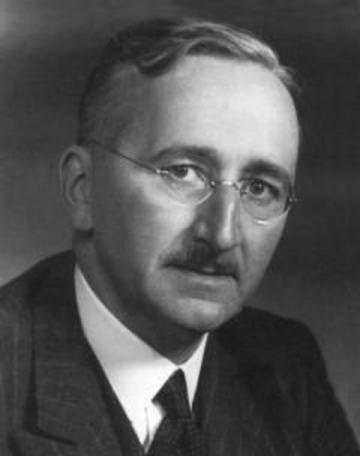
Friedrich Hayek (1899-1992).
By the 1990s, we’re told Isaiah Berlin is our sage, and we are meant to be anti-utopians to the core. Hegel is invoked but only to say there’s nothing left to do, except mopping up in the global South. But in fact, in practice, there was an enormous attempt at emancipating the globe through markets, under discipline and through global institutions, undertaken at precisely that moment, except that it was not explicitly defended in utopian terms. Insofar as it was a utopian project in practice, it was actually averse to the whole utopian frame of thought. So, historians of the 1990s, and you’re one of them, will have to reckon with this extraordinary clash between what we’re told liberalism is about and what it allows in the haze of the drunken victory at the end of the Cold War.
DM: Is it therefore possible that the discourse of Cold War liberalism obscured much of the utopianism in late-twentieth-century political thought? On the one hand, you noted in the first lecture your own memories of the 90s as lionising these Cold War liberals. But then I am also thinking here of how your own work on human rights utopianism slots into this. Or indeed, of how the new economy discourse and technological utopianism, internet utopianism in the 90s fit in? It feels like anti-utopian discourse and a kind of utopian attitude towards the future were finely intermeshed in the period.
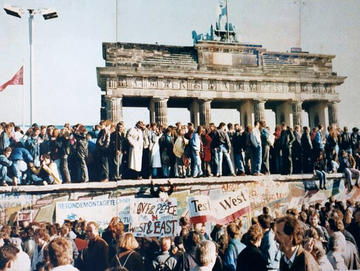
West and East Germans at the Brandenburg Gate in 1989.
SM: I think that’s a brilliant point, and if I had strayed beyond this most depressive moment of the 40s and 50s, I think I would have had to reckon with the empty space that Cold War liberalism sets up for new forms of liberal utopianism to rule. I guess the argument would be that what’s so useful about Cold War liberalism is that it clears the decks of more transformative liberal projects, allowing, I think, defective ones to rule in their absence. And yet, we do need to account for the fact that there’s a lot of utopianism in the 90s, and before and since. It’s just that rather than a left Hegelian vision of universal emancipation, neoliberalism subscribes to a vision of market emancipation instead.
DM: Jan-Werner Muller has recently written, in a book about Daniel Bell, that although, yes, characterised by a post-cold war triumphalism, 90s political thought was far more anxiety-ridden than is commonly remembered. Returning full circle, how does the legacy of Cold War liberalism help us to make sense of the “Long Nineties” more generally?
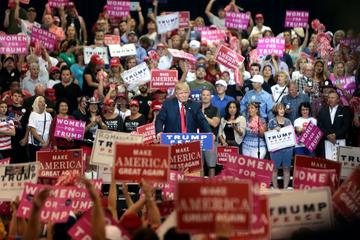
Trump campaigns in Phoenix, Arizona, October 29, 2016.
SM: Well, by clearing the decks of other utopian schemes, I have this sense that Cold War liberalism is responsible for the supremacy of the 1990s’ neoliberal projects and its culture of “no alternatives.” After all, the alternatives had been systematically delegitimised. That said, I agree entirely that if we take the anxiety of the 1990s seriously, Cold War liberalism was significant in a more existential way as well. Since that time, Cold War liberal tropes have been resurrected over and over again, directed against Muslims, Trump, and now Putin. And that has contributed to a sense of liberalism on endless trial, with the corollary that the status quo ante must be defended. Of course, for most of that period, neoliberalism continued to thrive in a practical sense, something which liberals have still not fully faced down.
DM: Given the dizzying speed of events over the past five or so years, from Trump through to Covid and the invasion of Ukraine, what do you think the discipline of history—especially intellectual history—is able to offer?
SM: This is where I would get Foucauldian, because I close the lectures with a shout-out to genealogical practice. I’m indirectly suggesting a normative and political direction for liberalism. But my main emphasis as a historian of political thought is really to document episodes of foreclosure, and to use history as a tool of opening up the space of intellectual and political possibilities, showing that Cold War liberalism was a suboptimal choice and potentially a disastrous one. And then it would fall on others to decide if that’s plausible, and what would we do in the space that’s available for pluralising alternatives. Do we find something to go back to in the left Hegelian tradition, and what would its credible form be in our time? And that’s where I leave things.


